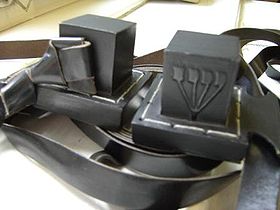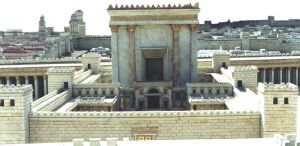Parashat Vezot Haberacha
– (The Parsha is read on Simchat Torah)
Simchat Torah Edition “And this is the blessing that Moshe, the man of G-d, blessed the children of Israel before his death” Seems like an ordinary verse, doesn’t it? But this ‘ordinary’ verse teaches us a very important lesson: we are elevated when we find merit in others. The Midrash comments on this verse: “Whoever speaks put in defence of the Jewish people is elevated. We have proof from Moshe – he was not called ‘the man of G-d’ until he spoke in defence of the Jewish people.” When we see our friends or colleagues doing something that we deem ‘unfair’ or ‘unjust’, it is all too easy to judge them or speak badly about them. In fact, anyone can find fault in others. It is very easy, and (unfortunately) often done. True greatness, however, is to see the good points of others. Towards the end of the Second World War, Simon Wiesenthal the renowned tracer of Nazi criminals, was in a concentration camp. A new arrival had smuggled in a siddur and Wiesenthal admired his courage, for by risking discovery, he was risking death. His feelings soon changed when he found that the courageous smuggler was bartering fifteen minutes rental of the siddur in exchange for one fourth of a days meagre rations. The inmates were emaciated, but willingly made the exchange. In time, the siddur owner died before anyone else, for the huge quantities of soup he ingested were too much for his shrivelled system. After the war, Rabbi Eliezer Silver visited the Displaced Person camps on behalf of the Vaad Hatzalah. He arranged prayers and addressed words of encouragement for the survivors. After noticing that the Wiesenthal did not come to the synagogue, Rabbi Silver decided to visit him. As Mr Wiesenthal recorded it: “That nights Rabbi Silver came to see me. He was a small man who wore an American Army uniform without insignia. He had a small white beard, and his bright eyes shone with great kindness. He must have been at least 75, but his mind was sharp and his voice was youthful. “He put his hand on my shoulder. ‘so they tell me you’re angry with G-d’, he said in Yiddish and he smiled at me. “I said ‘not with G-d, but one of His servants’, and told him what had happened. “He kept smiling, ‘and that’s all you have to tell me?’ “’Isn’t that enough Rabbi?’ I asked. “’Du Dummer (you silly man), ‘ he said. ‘So you look only at the man who took something! Why don’t you look instead at the man who gave something!’ He touched me with his outstretched palm and left. “I went to the services the next day. Ever since, I have tried to remember that there are two sides to every problem.” Rabbi Silver did not focus his attention on the act of taking, he only took note of the valour of starving people who gave away food for the opportunity to feel closer to the Almighty. Going further into the statement ‘Moshe, man of G-d’, we should mention the Midrash which tells us that Moshe’s upper half was G-dly, and his lower half was human. Rabbi Yisrael Salanter, the father of the Mussar movement, explains this statement as follows: For himself, Moshe was a spiritual being, but for others, he was human. The lesson we learn here is that although we should forgo pleasures for ourselves, we should nevertheless try to understand the needs of others and give them pleasure. When we fast on Yom Kippur, do we not give our children to eat? We must understand the needs of others – but for himself, a person should have as few needs as possible. In other words, one must have two sets of values, one for himself and one for others. One must shy away from honour and personal glory, but one must bestow honour on one’s friends (to a reasonable degree – don’t go over the top, as this also isn’t good). Conversely, a person should be humble, but he must never humble his fellow man. Similarly, undue concern about money is a bad characteristic. A person should go to the other extreme and not worry if he suffers a financial loss. But if your friend’s possession is on the floor, you must go out of your way and make sure that it isn’t managed. When I was in the business world, my cousin Michael (may he live and be well) used to always tell me that whatever stock you are sending out to a customer should be of a better standard than the customer himself would select. For others, he stressed, you must be more careful than you would for yourself. We learn a similar lesson further in the parsha: Whereas we should be happy when we receive good news for ourselves (as most people do!), we should always be happy for the good fortune of others. We learn this from the verse that tells us about when Moshe ascended Mount Nevo to view the entire land of Israel, the last act before his death. Writes the Ramban “Moshe was shown the entire land that the Jewish people would eventually acquire. Since G-d realised the great love that Moshe had fro the Jewish people, He wanted Moshe to rejoice over their good fortune by enabling him to personally view the land.” From here we see the virtuous qualities of Moshe. Usually when a person has a business partner and then suffers a loss, he separates from the partner and refuses to see him. But Moshe, although he was punished on account of Israel, he didn’t cast off their burden. Although Moses desperately wanted to enter Israel, he was denied. If you were in this situation, looking out at the entire land, wouldn’t you feel at least a tinge of jealousy? Look how much our great leader Moshe Rabbenu did for the Jews – and what did he feel? Nothing but true love for them, and utter joy over their ability to enter Israel. Now THAT’S what I call a leader! When Rabbi Avraham Grodzinsky was sitting shiva for his wife, a student of his told him that he had just got engaged. Though the poor Rav was left with eight young children to take care of, out of joy for his student, the Rav stood up and kissed him. At that moment, his personal suffering was not noticeable. Did you know…. · Moses was born after a gestation period of six months and two days (Midrash Hagadol, Shemot 2:2) SHABBAT SHALOM |





